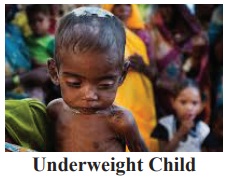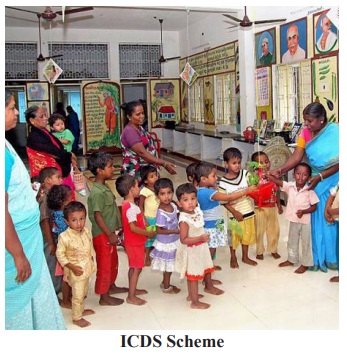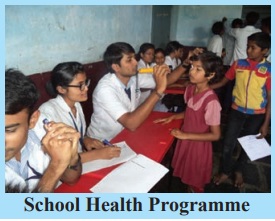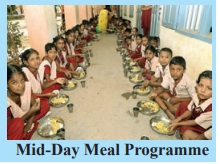Economics - Nutrition and Health Status | 10th Social Science : Economics : Chapter 3 : Food Security and Nutrition
Chapter: 10th Social Science : Economics : Chapter 3 : Food Security and Nutrition
Nutrition and Health Status
Nutrition and Health Status
Status of Nutrition
We noted
earlier that food security includes nutrition security too. Though our country
has reached self-sufficiency in food production, the nutrition status of the
population has not seen corresponding levels of improvement. In2015–16, 27% of
the rural women and 16% of theurban women (in the age groupof 15–49 years) Underweight
Child were counted as undernourished or chronically energy deficient by the
National Family Health Survey.

More than
half of the women in the reproductive age group (15–49 years) in both rural and
urban India were anaemic in 2015– 16. As regards children, about 60% of the
rural and 56% of the urban children (in the age group of 6–59 months) are
counted to be anaemic, in 2015–16. About 41% of the rural and 31% of urban
children are stunted, that is, they are not of the required height in
correspondence to their age. Another indicator of nutrition deficiency among
children is “underweight”, which is weight in relation to age. In India, in
2015–16, about 20% of children(in the age group of 6–59 months) in rural and
urban India are estimated to be underweight.

Nutrition and Health Status in Tamil Nadu
Nutrition
plays a crucial role in human health and well-being. At the national level,
despite higher economic growth, improvements in human development indicators
like nutrition levels of the population have been unacceptably slow. A large
number of Indian children are stunted. A substantial number of Indian children
and women are underweight, anaemic and suffer from micronutrient deficiencies.
To address these concerns, the Central and state governments have been
channellising substantial resources into various health and nutrition schemes
and programmes like Integrated Child Development Services (ICDS), mid-day
meals, Reproductive and Child Health Programmes (RCH) and National Rural Health
Mission (NRHM). However, an effective scaling up of these efforts is required
to mitigate the incidence of under-nutrition in the country.
Tamil
Nadu has played a pioneering role in bringing about significant changes in the
health and nutrition status of children under six years of age, pregnant women,
lactating mothers and adolescent girls. The Government of Tamil Nadu’s
successive budget outlays for nutrition and health are the highest in the
country. The performance of the ICDS scheme and the Puratchi Thalaivar MGR
Nutritious Meal Programme (PTMGRNMP) in Tamil Nadu are considered one of the
best in the country.
The
Government of Tamil Nadu’s policy for “A Malnutrition Free Tamil Nadu” guides
the state’s long-term multi-sectoral strategy for eliminating malnutrition. The
goal is “reducing human malnutrition of all types to the levels of best
performing countries”.In Tamil Nadu, ICDS is being implemented through 54,439
Child Centres (comprising 49,499 Anganwadi Centres and 4,940 Mini Anganwadi
Centres) in 434 Child Development Blocks (385 rural, 47 urban and 2 tribal).
With
steady expansion into unreached areas, increasing coverage of marginalised
groups, enhanced allocations and enlarged scope of services, ICDS is now
considered to be one of the world’s largest programmes of its kind.
The PTMGRNMP is considered to be the largest noon meal programme in the country for combating malnutrition among children, increasing primary school enrolment and reducing dropout rates. Other states in the country have modelled their noon meal programmes along the lines of Tamil Nadu’s pioneering efforts.
Important ongoing Schemes in Tamil Nadu
1. Under Dr. Muthulakshmi Reddy Maternity Benefit Scheme,
financial assistance to the tune of ₹ 12,000 is being disbursed to poor
pregnant women.
2. The Chief Minister’s Comprehensive Health Insurance Scheme
was launched in the state in 2011-12 with the aim to provide Universal
Healthcare to all by providing free medical and surgical treatment.
3. Tamil Nadu Health Systems Projects (TNHSP) has launched
ambulance services free of cost (The 108 Emergency Ambulance Service).
4. The School Health Programme emphasises on providing
comprehensive healthcare services to all students studying in Government and
Government-aided schools.
5. The National Leprosy Eradication programme is being
implemented in the state with the aim to detect and to provide sustained
regular treatment to all leprosy patients.

Some Nutrition Programmes in Tamil Nadu
1. Puratchi Thalaivar M.G.R.
Nutrition Meal Programme:
2. National Programme of Nutritional
Support to Primary Education
3. General ICDS Projects and World
Bank Assisted Integrated Child Development Services:
4. Pradhan Manthri Gramodaya Yojana
Scheme (PMGYS):
5. Tamil Nadu Integrated Nutrition
Programme:
6. Mid-Day Meal Programme:

Related Topics